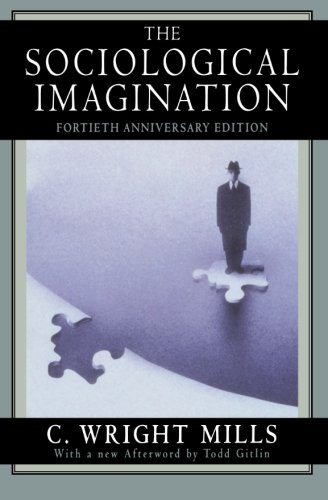Have you ever found yourself wondering why certain social patterns exist, or why individuals behave the way they do in specific situations? Perhaps you’ve felt a sense of unease about the state of the world, but haven’t been able to pinpoint the root cause. These very questions lie at the heart of sociological imagination, a powerful tool for understanding the complex interplay between individual lives and broader social forces.

Image: talisman-intl.com
Sociological imagination, a concept coined by the renowned sociologist C. Wright Mills in 1959, encourages us to step outside our personal experiences and see the world through a sociological lens. It’s about recognizing that our individual lives are shaped by larger social structures, historical processes, and cultural norms, and that our actions, in turn, contribute to these structures. In essence, sociological imagination is the ability to connect personal troubles with public issues, to see the individual in the context of society, and to understand how personal experiences are influenced by broader social forces.
Understanding the Essence of Sociological Imagination
Imagine yourself standing in a bustling city. You notice a homeless individual begging for money on a street corner. You might feel pity or discomfort, but how do you make sense of their situation? Sociological imagination encourages us to look beyond these immediate feelings and delve deeper. We might ask: What social factors contribute to homelessness in this city? Are there systemic issues within the housing market or welfare system that contribute to this individual’s predicament? How might their personal choices intersect with these broader social forces to create this outcome?
The Power of Seeing Beyond Personal Experiences:
It’s easy to get caught up in our own lives and assume that our experiences are unique and independent of the world around us. But sociological imagination helps us break free from this “personal bubble” and recognize the interconnectedness of our lives with the lives of others.
For example, let’s consider the issue of unemployment. If you’re personally unemployed, you might feel discouraged and frustrated. However, from a sociological perspective, we can see that unemployment is a broader social issue that impacts entire communities and even national economies. We might then ask questions about the current economic climate, the availability of jobs in specific sectors, government policies related to job creation, and the social stigma surrounding unemployment.
Examples of Sociological Imagination in Action
Sociological imagination isn’t just an abstract concept; it’s a framework for understanding and analyzing the world around us. Let’s explore some real-world examples:
- The #MeToo Movement: This movement, which brought to light widespread sexual harassment and assault, can be understood through the lens of sociological imagination. It revealed the deeply ingrained patterns of power and gender inequality within society that allowed for such behavior to persist and remain largely unexamined for decades.
- The Rise of Social Media: The proliferation of social media platforms has had a profound impact on how we communicate, consume information, and form social connections. From a sociological perspective, we can examine the influence of social media on societal norms, political discourse, and even mental health, recognizing that this technology is not just a tool for individual interaction, but a powerful force that shapes our collective experience.
- Education and Social Mobility: Why is there a persistent gap in educational attainment across different socioeconomic groups? Sociological imagination encourages us to explore the interconnectedness of factors such as social class, family background, access to resources, and institutional discrimination that contribute to these disparities.
:max_bytes(150000):strip_icc()/sociological-imagination-3026756-FINAL-f28c1158b957481d9db68a1c0363e112.png)
Image: ar.inspiredpencil.com
Why Sociological Imagination Matters Today
In an increasingly interconnected world, where global trends impact our everyday lives, sociological imagination is more essential than ever. It equips us with the critical thinking skills to navigate complex social issues, challenge dominant narratives, and contribute to a more equitable and just society.
Benefits of Cultivating Sociological Imagination:
- Enhanced Understanding of Social Issues: It allows us to step outside our individual experiences and gain a deeper understanding of the root causes of social problems.
- Critical Thinking and Problem-Solving: It equips us with the tools to analyze complex social phenomena and identify potential solutions.
- Empowerment and Action: It fosters a sense of responsibility and encourages us to take an active role in shaping the world around us.
Developing Your Sociological Imagination:
So how can we cultivate this powerful tool for navigating the complexities of modern life? Here are some practical steps you can take:
- Engage with Social Issues: Stay informed about current events, read news from different sources, and explore diverse perspectives.
- Observe and Reflect: Pay attention to your surroundings, noticing patterns and inequalities. Ask yourself questions like: Why are things the way they are? What factors contribute to these patterns?
- Question Assumptions: Challenge common narratives and stereotypes. Consider different interpretations and research alternative perspectives.
- Explore Different Cultures: Immerse yourself in different cultural experiences through travel, books, movies, or conversations with people from diverse backgrounds.
- Participate in Social Action: Get involved in movements, organizations, or groups that address social issues you care about.
What Is Sociological Imagination And Examples
Conclusion
Sociological imagination is a powerful tool for understanding the world around us, connecting personal experiences with broader social forces, and fostering critical thinking. By cultivating this ability, we can become more informed, engaged citizens capable of navigating the complexities of modern society and contributing to a more just and equitable world. Embrace the power of sociological imagination and see the world in new and insightful ways.






